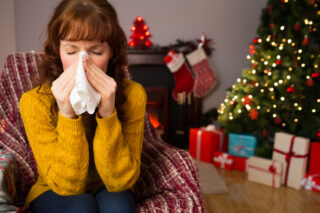
More Child Health and Safety Articles
The Holiday Season and Colds

Coming down with a cold during the holidays can turn your holiday season into drudgery.
You catch a cold when a virus invades your nose or eyes. You might breathe in airborne droplets, but far more often, you catch a cold by touching a germy surface or having direct contact with a person who has a cold and then touching your nose or eyes.
Your risk of catching a cold is greater when you are indoors most of the time, when the air is dry, and when you have close contact with other people. During the holiday season, people travel in trains, planes, and automobiles and are probably sharing the ride with some of the 200 viruses that cause the common cold.
To Lessen Your Risk
Avoid prolonged close contact with people who have colds. Handshaking, hugging, and sharing meals and good times are so much a part of the holiday season, exposure to cold viruses is probably inevitable.
Keep your hands away from your nose and eyes because cold viruses can live up to three hours on your skin.
Wash your hands, with soap and water, often. Scrub the backs of your hands, between your fingers, and under your nails – not just your palms – for a full 15 seconds and rinse well. Dry your hands with a disposable towel, and turn off the faucet using the towel. If soap and water are unavailable, use an alcohol-based hand sanitizer.
Clean your personal items. Cold viruses can live on surfaces (especially nonporous surfaces such as plastic, metal, or glass) for up to 48 hours. Use disinfectant wipes to clean the surfaces you regularly touch this holiday season – your laptop keyboard, your cell phone, your car’s steering wheel.
Treating a Cold On the Road
The saying goes that there’s no cure for the common cold, but even so, you can feel more comfortable – even when you’re far away from home. Your goal is to relieve your symptoms.
Try Natural Ways To Feel Better:
Drink lots of water. Doctors recommend eight glasses a day to keep your nose and throat moist and to loosen congestion. Avoid alcohol and caffeine drinks because they dry out – or dehydrate – your system. A salt-water gargle may soothe your sore throat.
Get plenty of rest. If possible, adjust the temperature and humidity of your sleeping area to be moist and warm, but not overheated.
Eat right. No scientific evidence backs the old adage, “Starve a cold; feed a fever.”
Don’t smoke. Smoking can dehydrate your body and make your symptoms worse.
Use over-the-counter medications to treat your symptoms.
Your regular pharmacy back home probably has a branch near your holiday travel destination. Find out the location of the nearest pharmacy before you leave home. Some common products that may help include the following:
Saline nasal sprays can fight stuffiness and congestion.
Decongestants and pain relievers may relieve your symptoms, even though they will not shorten the duration of your cold. People sometimes complain of feeling feverish with a cold, but colds and fever don’t usually go together. However, you may run a temperature of 100ºF – enough to slow you down a bit.
Ask the local pharmacist about complementary or alternative treatments such as:
Homeopathic remedies (used within the first 24-48 hours of symptoms) such as zinc lozenges and intranasal zinc gluconate. Recent clinical studies have demonstrated that treatment with intranasal zinc nasal gel is effective in reducing the duration and severity of common cold symptoms within 24-48 hours of symptom onset.
Vitamins and herbal supplements such as vitamin C and Echinacea.
Information obtained from American Pharmacists Association.
Other Articles You May Find of Interest...
- Nurturing Emotional Resilience in Children: A Guide For Parents
- Springtime Allergies: Exploring Holistic Options For Relief
- Healthy Snacks For Your Children
- Twelve Valuable Parenting Principles
- Nurturing Healthy Sleep Habits in Infants and Toddlers
- Children’s Health and Spring Time
- Chiropractic Care For Your Child

















